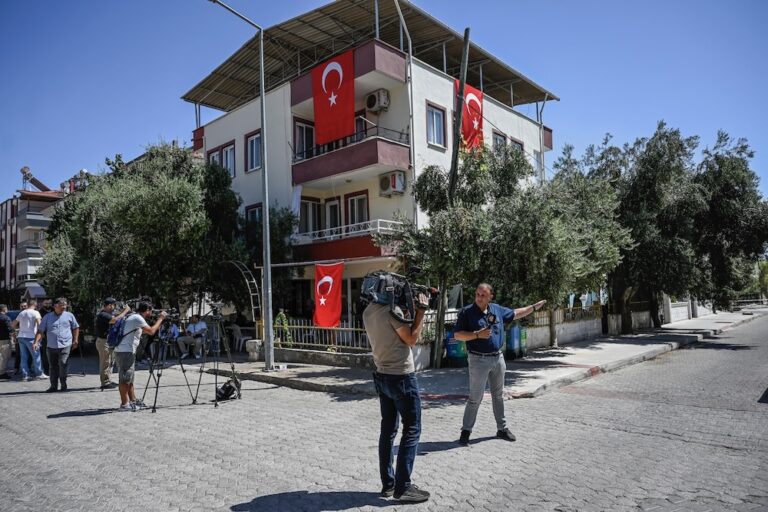(WiPC/IFEX) – The numbers of writers and journalists currently on trial or facing court hearings in the near future has reached worrying levels in Turkey. At the same time, proposed constitutional amendments which, it was hoped, would improve the status of free expression in Turkey, appear instead to recommend the extension of the scope of […]
(WiPC/IFEX) – The numbers of writers and journalists currently on trial or facing court hearings in the near future has reached worrying levels in Turkey. At the same time, proposed constitutional amendments which, it was hoped, would improve the status of free expression in Turkey, appear instead to recommend the extension of the scope of the courts to penalise those who criticise the Turkish state or its institutions.
International PEN has in its records over seventy people facing judicial proceedings solely for their writings. Although many of them are not yet in prison and for the vast majority the likely outcome is a non-custodial sentence, such as a suspended prison term or fines, the effect of such wide scale judicial action on the right of free expression in Turkey is extremely worrying.
Even the works of the most eminent and internationally renowned authors are not exempt from prosecution. On 13 February 2002, American author Noam Chomsky will be present at the State Security Court in Istanbul to support Fatih Tas, editor of the Aram Publishing House, who is on trial for publishing Chomsky’s “American Interventionism”. Tas is accused of having contravened Article 8 of the Turkish Anti-Terror Law for “separatist propaganda”.
The following day, 14 February, commentator Burak Bekdil faces the second hearing of a case against him for a satirical article ridiculing the Turkish judicial system. He is charged under Article 159 of the Turkish Penal Code (“insult to the state and its institutions”) and faces up to six years in prison.
In January, Ömer Asan, author of the acclaimed linguistic and cultural study “Pontus Kültürü” (“The Culture of the Pontus”), was brought before the State Security Court along with his publisher to hear charges of “separatist propaganda”. This followed a television interview in which Asan was accused of being a “traitor” for the findings published in his book. The first trial hearing date is yet to be set.
Another eminent writer, Kurdish author and member of International PEN Mehmed Uzun, usually resident in Sweden, is, alongside his publisher Hassan Öztoprak, on trial following the 3 October 2001 seizure of Uzun’s book “To Create a Language”, in which Uzun comments on Kurdish literature and language. Both are facing charges of “promoted separatism” under Article 8 of the Anti-Terror Law.
These are just some of the most prominent and recent cases being heard before the Turkish courts. They are indicative of the type of problems faced today by writers in Turkey. This is despite the Turkish government’s efforts to improve relations with the European Union (EU), which it wishes to join. In an effort to meet the requirements of EU entry, the Turkish government has undertaken a commitment to improve its human rights record. Yet free expression organisations were alarmed that proposed constitutional amendments, revealed on 24 January, actually increase the number of penalties for “press crimes” (see IFEX alert of 6 February 2002). Among others, these amendments are said to include widening the interpretation of “insult” to cover the vaguely defined “a segment of the population” and providing for new penalties for insulting “Turkishness”. These amendments have caused controversy within Turkey and are likely to face strong opposition nationally and abroad.
International PEN is alarmed by the continuing use of the Anti-Terror Law and criminal libel laws to penalise writings that are critical of the Turkish institutions and commentaries on Kurdish and other minority issues. The organisation calls for an end to trials against writers whose only “crime” is to comment on controversial issues. It further calls for a review of all legislation that contravenes the right to freedom of expression as guaranteed by international instruments, notably Article 19 of the United Nations Declaration on Human Rights, and Article 10 of the European Convention on Human Rights.
Recommended Action
Send appeals to authorities:
– expressing concern at the large number of trials against writers and journalists in violation of their rights to freedom of expression
– referring particularly to the cases against Tas, Bekdil, Asan, Uzun and Öztoprak
– calling for an end to prosecutions of writers whose only acts have been to criticise the authorities or to comment on the issues of minority rights and self-determination
– expressing alarm at proposed constitutional amendments that would expand the penalties against those who practice their internationally recognised right to freedom of expression
Appeals To
Prime Minister Bulent Ecevit
Basbakanlik
Cankaya
Ankara, Turkey
Fax: + 90 312 417 0476
His Excellency Hikmet Sami Turk
Minister of Justice
Adalet Bakaligi
06440 Bakaniklar
Ankara, Turkey
Fax: + 90312 417 395
Please copy appeals to the source if possible.


